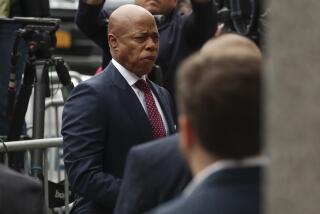Barry Flies to Florida Substance Abuse Clinic : Drugs: NAACP official Hooks questions whether the mayor of Washington is being prosecuted unfairly.
- Share via
WASHINGTON — Amid continuing controversy over his arrest for allegedly smoking crack cocaine, District of Columbia Mayor Marion Barry flew to a Florida alcohol and drug abuse treatment clinic Monday, leaving his office in the hands of a career civil servant.
“We’ve acted in the mayor’s absence before,” Carol B. Thompson, the city administrator, said at a press conference. “There will be no leadership vacuum.”
Just a day after vowing to “heal my body, mind and soul,” Barry and his wife, Effi, left their Washington home at about 6 a.m., en route to the Hanley-Hazelden Center in West Palm Beach.
The announcement by Lurma Rackley, the mayor’s press secretary, said Barry will be receiving treatment for alcoholism.
Thompson, 38, who was given control of the day-to-day duties of running the nation’s capital Friday, said she did not know how long Barry would be gone.
Meanwhile, a top civil rights leader, Benjamin L. Hooks, questioned whether Barry had been unfairly singled out for prosecution.
“I’m not trying to justify any wrongdoing . . . (but) I am opposed to selective enforcement of the law,” the NAACP executive director said.
Hooks said accounts of the sting in which Barry was arrested made it sound like “the search had finally paid off. We spent all of these years trying to find him with a grain of cocaine, and by God, we did it, didn’t we?”
He added: “We haven’t found all the people who’ve stolen all the money from the savings and loan associations and are driving Rolls Royces and Jaguars, so obviously many of us in the black community will have some peculiar feelings as we go further.”
When a reporter asked if he opposed bringing law-breakers to justice, Hooks replied:
“No, I think you ought to bring everybody to justice for violating the law. That would have meant most of us here would be arrested for speeding, spitting on the sidewalk or something. If we can afford to do it, let’s do it.”
Hooks’ comments came after his second meeting in two weeks with President Bush on the recent wave of bombings and threats against civil rights activists and sympathizers.
Asked later whether Bush thought there had been any harassment of black officials by federal investigators, White House Press Secretary Marlin Fitzwater said: “This issue did not come up in the meeting. We are not going to have any comment on the Mayor Barry situation. And we simply urge our investigators, law enforcement agencies, and everyone to be very careful that that never . . . happens.”
Barry, 53, has long been dogged by persistent rumors of his drug use, but had steadfastly denied all charges and frequently lectured schoolchildren about the danger of using drugs.
He was arrested Thursday night at a swank downtown hotel during a sting operation staged by the FBI and district police. Barry had been lured there by a longtime woman friend who, prosecutors said, had decided to cooperate with authorities. Officials have said they captured him on videotape buying and then smoking crack cocaine.
Barry intends to plead innocent to the federal misdemeanor charge, said R. Kenneth Mundy, his lawyer.
His departure left many questions unanswered, such as whether he will complete the 11 remaining months of his term and whether he will seek reelection.
A variety of political activists are discussing a campaign to draft civil rights leader Jesse Jackson, who recently moved to the district. Early surveys gave Jackson a wide lead over all other potential candidates.
In the meantime, Thompson is empowered to perform all the duties of the mayor during his absence, except for signing and vetoing legislation and signing contracts.
“At this time, we have to take one day at a time,” Thompson said.
The West Palm Beach treatment center has a capacity for 40 men and 20 women. It is a nonprofit chemical dependency clinic.
Officials there declined to comment on Barry’s reported admission. But John S. Baudhuin, former treatment director at the center, said the cost of an average 30-day stay is about $6,500. He said patients typically are assigned to a large, four-person room, where each one has a single-bed, a desk and closet space.
They are addressed by first names only and spend most of the day, including evenings, in group therapy sessions, There is also time for casual recreation or exercise on the campus-like grounds, Baudhuin said.
Treatment is centered on positive peer pressure, he added. Other patients whom Barry is likely to encounter at the center are largely middle class professionals: “engineers, teachers, lawyers, occasionally performers,” Baudhuin said.
Most patients have dependency problems with both illicit drugs and alcohol, he said.
“He’ll get very good treatment there,” Baudhuin added.
Mrs. Barry and one of the mayor’s bodyguards reportedly flew back to Washington on Monday night.
Mike Clary contributed to this story from Miami.
More to Read
Sign up for Essential California
The most important California stories and recommendations in your inbox every morning.
You may occasionally receive promotional content from the Los Angeles Times.










